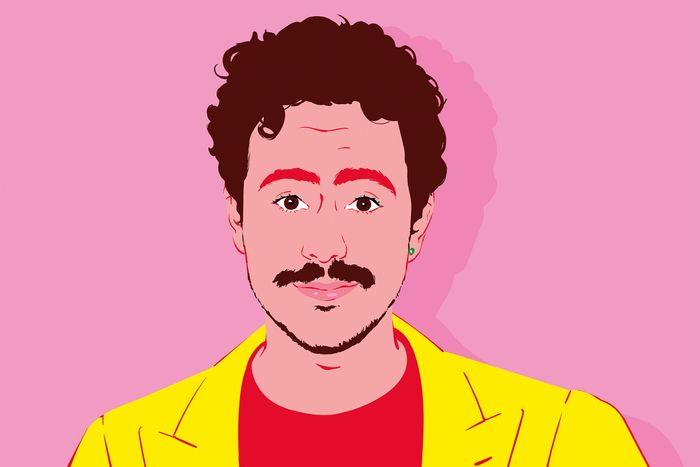
Ramy Youssef has been writing comedy about Israel and Palestine for years. Before October 7, he was touring an hourlong set that included a story about going home with a woman and finding she had an Israeli flag on the wall. “I’m horny, so I’m trying to justify it,” he says. “This is the Star of David. That’s their logo. It’s just Jewish … Big.” Post–October 7, he didn’t have to throw everything out and start over, but he knew he’d need to write about it after friends started reaching out.
“October 10th, I get a call from a guy I know,” starts a joke ten minutes into Youssef’s new special, More Feelings. “ ‘Yo, bro, where you at with … Hamas?’ ” Youssef is defiant: “Where I’m at? … Are we fucking?” His tone turns serious. “You think any of us like what happened?” he says. “We hate seeing people die. It made me cry.” The audience interrupts him, breaking into applause. Youssef returns to the conversation with his friend: “You know me. You think I’m Hamas? Bro, I’m a Taliban guy.”
Was this the first joke you came up with after October 7?
That joke was the first thing that came out of a set soon after. I would start by saying, “I’m not sure we’re supposed to be here. I’ve been depressed. This has been really hard.” I would address the Jewish folks in the room, too: “Listen, I know you also have had a really hard time.” There’s so much generational trauma. We’re all sorting through a lot of feelings. It’s why my stand-up has always been called Feelings, because this is a space to do that. And then I’d talk about this phone call I had with a friend and get into that joke.
At a certain point, it became clear that I could just get into the joke part of it. Part of that too was because I started to use the proceeds of the show to donate to humanitarian aid that was going into Gaza, so people understood that context coming into the show. Then very quickly I would get into the joke.
Vibe Check
How New York Comedians Are Joking About Israel-Palestine
What can you tell me about the October 10 phone call?
The truth is that call is many calls. It’s a few people who were close to me and people who weren’t. I had to have a little bit of grace for people who, whatever their backstory is, all of a sudden on October 7 went, Huh? What’s going on over there? And then they asked these questions that were shocking. It made me feel like when I was a kid and I had to explain to people that I wasn’t a terrorist, as if my faith and where I come from meant I have this proximate agreement to violence.
I know a lot of people in my life who would say, “Man, I don’t need to deal with that.” I fully understand that point of view. But I had that little extra thing in me that’s probably from my parents, who are really gracious. My dad was a hotel manager, and his whole thing was “You got to make people feel good. You have to take care of people.” So I just say, “Okay, I’m feeling upset. I’m feeling wild that I even have to explain this to you. But also, I have the space to talk about it.” And with the hope that that could be an offering.
How do you make those feelings funny?
It just made me laugh because it’s a hilarious position to be in. It’s like, I’ve known you my whole life … And let’s be real: What’s really the bottom of the question? The bottom of the question is “You think I might like this? You think there’s a chance I think terrorism’s cool?” And then it becomes a really funny setup for a joke where there’s this idea that I’m going to tell you, “Hey, no. I’m super-peaceful.” The joke is set up that way and then takes the other turn, which is just classic comedy.
How did you approach the non-joke part of the joke, when you allow yourself to get claps? Did you think, This is worth it because then it really sets up the joke? Or, This is worth it because I want to say this?
It’s both. It’s funny because it’s sincere in my mind. I have room for all these feelings, and I want to talk to you about it. But also, Fuck you, you know? There is nothing on earth that isn’t sitting in some crazy duality. And that’s my relationship with my friends. It’s my relationship with my audience. It’s what makes it funny.
Was the punch line always “Taliban”?
We piloted other groups. We tried “Boko Haram,” but their brand isn’t strong enough to really get the pop or the laugh you want.
Wait, really?
No, no, no. It was always “Taliban.”
I wouldn’t put it past any comedian.
Yeah, you’re sitting with six guys and being like, “Well, yeah, what group should it be?” That’s not the kind of joke you can workshop with a bunch of Arabs, though, because at a certain point someone non-Arab shows up and goes, “What are you guys talking about?” The joke in and of itself creates the problem you’re trying to avoid.
What do you think the role of the comedian is in a situation like this?
Jon Stewart came to one of the tapings. When I first met him, I told him I remembered when I was in high school feeling that the only voice that cared about me on TV was this Jewish comedian from New Jersey. We present incredibly differently in so many ways, but I feel a kinship to the idea that there’s something worthy in processing absurdity by sitting in it. And Jon did that so well.
That said, as traditional media continues to disintegrate into being so unfocused, so biased, so disingenuous in describing what is happening, there’s this weird thing of Well, maybe I can get my truth from the comedians because they’re the real philosophers. Part of the design of the joke we’re talking about is I go out of my way to say, “Yeah, no. I’m also not going to do that.”
More From ‘good one’
- How to Turn Your Drama into a Thriller With a Single Line of Dialogue
- Ego Nwodim Is in Her Silly Season
- John Early Breaks His Silence on His Joke About Us





